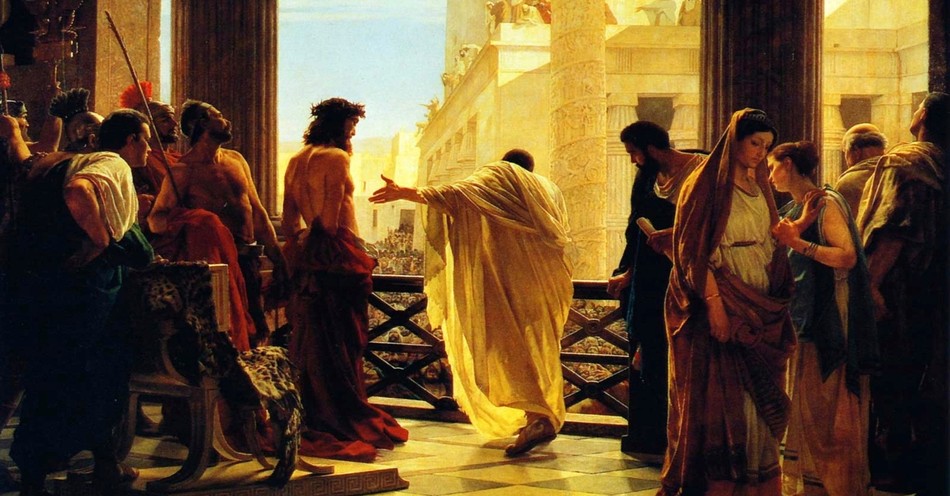"But they kept shouting, 'Crucify him! Crucify him!'" - Luke 23:21
"Just picture the crowds: They were fierce and furious, more noisy and clamorous, the more they perceived Pilate was for saving him; and they were more desirous to have him crucified, and more impatient until it was done, as the repetition of the word shows." (John Gills Commentary)
During the Passion Week, the crowd in Jerusalem seems to have had a major swing in opinion. Jesus entered the city to praise and adoration but, by the end of the week, faced a crowd shouting "Crucify Him!" demanding for his crucifixion. Can such a change really happen so quickly?
We must consider first that the people shouting "Hosanna" when Christ arrived were not the residents of Jerusalem. Instead, He rode in the company of pilgrims coming to the city for Passover. Because of the news about Jesus raising Lazarus from the dead and hopes that the Messianic Kingdom would soon begin, these pilgrims took to shouting and praising in their enthusiasm. Singing on the road to Jerusalem was not uncommon, and with their false ideas about a Rome-conquering Messiah, the enthusiasm spilled over into palm branches.
Most of the people in Jerusalem, to put it mildly, disagreed with the "unlearned" rabble from the country. Among these types, we find the Pharisees, who urged Jesus to rein in the crowd. When Jesus refused and claimed the rocks would praise Him if the people didn't, their animosity only grew. Between these two opposing currents, Jesus rode into town.
We can envision a Jerusalem packed with outsiders pressing close to hear Jesus answer the challenges of Israel's leaders who came to embarrass Him. But this only incited more anger. Jesus had at least the superficial support of the outsiders, but the insiders—though they feared the temporary crowds—only needed opportunity, which came soon enough.
From Warren Weirsbe's Bible Commentary we also learn a bit more of the context around the crowd who yelled "Crucify Him!":
"We must not think that the general populace of the city was gathered before Pilate and crying out for the blood of Jesus, though a curious crowd no doubt gathered. It was primarily the official religious leaders of Luke 22—23 219 the nation, the chief priests in particular (Luke 23:23), who shouted Pilate down and told him to crucify Jesus. To say that the people who cried “Hosanna!” on Palm Sunday ended up crying “Crucify Him!” on Good Friday is not completely accurate."
Why Did The Crowd Want to Crucify Him?
Thus, when those insiders arrested Jesus and brought Him to trial, the former supporters likely felt intimidated by the authority of the leaders. Supporting someone is much easier when there's a reduced chance of being imprisoned for it (e.g., Peter's denials). And perhaps some of those wrapped up in the enthusiasm for Jesus were just as quickly wrapped up in the fervor against Him.
At the height of his ministry and miracles, many Jews came to believe in Jesus as Messiah, the Son of God. Jewish leaders feared Jesus because of his growing followers. With the help of Judas Iscariot, Roman soldiers arrested Jesus and he was put on trial for claiming to be the king of the Jews. According to Roman law, the punishment for rebellion against the king was death by crucifixion.
Near the end of His trial, Pilate attempted a way to free Jesus. Pilate permitted the crowd to choose between a condemned convict named Barabbas and Jesus. Instead of choosing Jesus, as Pilate had expected, the crowd chose Barabbas for release.
“Do you want me to release to you the king of the Jews?” asked Pilate, knowing it was out of self-interest that the chief priests had handed Jesus over to him. But the chief priests stirred up the crowd to have Pilate release Barabbas instead. “What shall I do, then, with the one you call the king of the Jews?” Pilate asked them. “Crucify him!” they shouted. “Why? What crime has he committed?” asked Pilate. But they shouted all the louder, “Crucify him!” Wanting to satisfy the crowd, Pilate released Barabbas to them. He had Jesus flogged, and handed him over to be crucified. - Mark 15:9-15
The Roman governor Pontius Pilate was hesitant when it came to the penalty for Jesus. Pilate could find no wrongdoing in Jesus, yet he wanted to give the people what they desired, which was the death of Jesus. Pilate rinsed his hands in front of the crowd to signify that he was not taking responsibility for the killing of Jesus and then handed Jesus over to be beaten and lashed. Jesus had a crown of thorns thrust on his head and made to carry his cross along the pathway to the hill where he would be crucified.
In summary, the crowd's cry of "Crucify him!" regarding Jesus can be attributed to several factors:
Religious Leaders' Influence: The religious leaders, particularly the chief priests and Pharisees, strongly opposed Jesus because they perceived him as a threat to their authority and religious traditions. They influenced the crowd with their negative views about Jesus.
Fear and Political Pressure: Some members of the crowd may have been influenced by political pressure from the Roman authorities. They may have feared that Jesus' popularity and teachings could lead to unrest and a Roman crackdown on the Jewish community.
Misunderstanding of Jesus' Mission: Many people in the crowd had different expectations of the Messiah. Some expected a political or military leader who would free them from Roman oppression, while Jesus' mission was primarily spiritual and focused on the kingdom of God. This misunderstanding may have contributed to the crowd's disappointment and anger.
Manipulation: The crowd may have been manipulated by instigators who spread false information or fueled anger against Jesus, leading to the cry for his crucifixion.
Not all those who supported Jesus turned against Him. It's important to note that not everyone in the crowd called for Jesus' crucifixion, and there were also individuals who loved him and stood by him. Some, in fact, later wrote the accounts we have today.
Adapted and updated from The Life and Times of Jesus the Messiah by Alfred Edersheim (Book V, Chapter I).
Was God Surprised When People Wanted to Crucify Jesus?
The phrase "God has a plan" has become something of a cliché—with a negative connotation for many people. But in the circumstances leading up to the crucifixion of Jesus, the Gospel accounts provide confirmation that God does indeed have all things well in hand.
Far from being surprised or swept along, Jesus carefully orchestrated the events of the Passion Week (His last week on earth). This doesn't mean He manipulated those responsible for sending Him to the cross; rather, He brought out their seething hatred and true responses to His teaching.
According to Acts 2:23, the crucifixion progressed according God's prior intent, and the Passion Week allows us a glimpse at just how this happened. With His arrival during the Triumphal Entry, Jesus came as the promised Messiah at exactly the right moment in history (see Daniel 9). The common people welcomed Him with Messianic shouts of "Hossana," something completely intolerable to the Pharisees. However, the elite Sadducees enjoyed control of the Sanhedrin (the religious council), and even this type of welcome did not move them.
So, Jesus took His message to them. On Monday, He cleansed the Temple of moneychangers for the second time during His ministry and then staked His rightful claim to His Father's House. In fact, He wouldn't even permit merchandise to be carried through the Temple (Mark 11:16). The Sadducees did notice someone invading what they considered to be their turf.
Thanks to the superficial favor of the crowd, Jesus kept the leaders of Israel at bay for several days until the time appointed by God. And even then, those same leaders still feared the crowd's response enough to conduct a nighttime trial and to take Him to the Romans for death by crucifixion rather than by stoning, just as the Old Testament had shown.
The wickedness of humanity put Jesus on the cross, but none of the events took Him by surprise. He had warned His disciples when, where, and how His death would come because God had planned it before the earth had formed.
Adapted from the lecture notes of Dr. Doug Bookman, professor of New Testament Exposition at Shepherds Theological Seminary (used by permission).
Photo Credit: fliker
Learn more about the meaning and significance behind the Easter holiday and Holy Week celebrations:
What is Lent? and When Does Lent Start?
What is Ash Wednesday? and When is Ash Wednesday?
What is Palm Sunday?
What is Maundy Thursday?
What is Good Friday? and When is Good Friday?
What is Holy Saturday?
What is Easter? and When is Easter Sunday?
Easter Bible Verses
The Resurrection of Jesus
Easter Prayers



